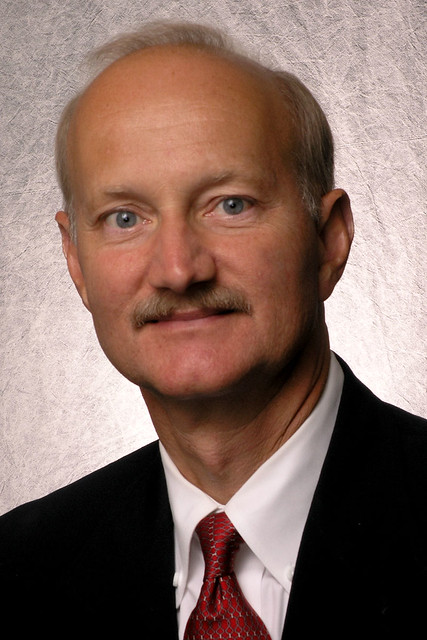Feb. 4, 2021
Robert Bacon, wheat breeder, professor and department head, retires after 37 years with Division of Agriculture, Bumpers College
By Fred Miller
U of A System Division of Agriculture
@AgNews479
Fast facts
- Robert Bacon retires after 37 years with Division of Agriculture, Bumpers College
- Served as wheat breeder, later as department head
- Nathan Slaton serving as interim department head
(639 words)
Download PHOTO of Robert Bacon: https://flic.kr/p/2jN7C5F
FAYETTEVILLE, Ark. — Robert Bacon joined the Arkansas Agricultural Experiment Station as a wheat breeder in 1984. But really, he counts his start with the University of Arkansas System Division of Agriculture as an hourly worker while still an undergraduate student at the University of Arkansas.
Bacon retired Jan. 8 after 37 years, the last 15 years as head of the department of crop, soil and environmental sciences for the Division of Agriculture and the Dale Bumpers College of Agricultural, Food and Life Sciences at the U of A.
He earned his bachelor’s and master’s degrees from the U of A, then earned his doctoral degree in agronomy, specializing in crop breeding, at Purdue University. With his Ph.D. in hand, Bacon came home to Arkansas.
In addition to breeding wheat, oats and canola, Bacon carried a heavy teaching load in Bumpers College, and he found his association with his students as rewarding as his research.
Bacon expresses a sense of pride on those occasions when he’d encounter former students at a conference and see how successful they’d become in their field. But he said students also became a measure of when to move on.
“When I began to see the children of my former students in class,” Bacon said with a grin, “that’s when I began to think about retiring.”
Nathan Slaton, associate vice president for agriculture and assistant director of the Agricultural Experiment Station, will serve as interim department head for crop, soil and environmental sciences.
“Robert served the department and the state during a time when Arkansas was growing a million acres of wheat,” Slaton said. “And as a researcher, and later as department head, he has seen the department evolve and adapt with the changes in Arkansas agriculture over 37 years.”
The academic program has grown since Bacon became department head, Slaton said. “The undergraduate program is larger now,” he said. “I attribute that to Robert’s leadership in curriculum development and priorities in faculty hires.”
Bacon said the department has become more diverse over the years, in more ways than one.
“It was the department of agronomy when I began,” he said, “and it was all men then. Karen Moldenhauer (rice breeder at the division’s Rice Research and Extension Center) was the only woman.” He said the department has changed with the times to become more diverse in gender and ethnicity.
The department of agronomy was renamed the department of crop, soil and environmental sciences to reflect more diverse research and academic programs.
“When I started, all the soil science was related to crop production,” Bacon said. “Today, environmental sciences have become more important in relation to agriculture. It was always on my mind that I wanted our research and teaching programs to remain relevant.”
Looking back over his 37-year career, Bacon can see dramatic changes in technology. “One thing that strikes me now is that I can remember when no one had a computer. John Gilmore (a former faculty member) told me, ‘You should really get a computer.’ And I was like, why? If I need a computer there’s one in the computer lab.”
Bacon said his career was buoyed by great mentors, like Bobby Wells, who drove the experiment station’s early rice research, and Chuck Caviness, crop breeder who developed ArkSoy, the division’s first soybean variety adapted to grow in Arkansas.
Since retiring, Bacon said he has been adjusting to not living by a clock. He and his wife, Dian, intend to continue living in Fayetteville. “It’s home to us,” he said.
Slaton said a national search is planned for a new department head for crop, soil and environmental sciences. “We’re looking at 12 to 18 months to execute the search,” he said.
In the meantime, Slaton is developing a strategic hiring plan to fill research and teaching faculty positions left vacant by recent retirements.
To learn more about Division of Agriculture research, visit the Arkansas Agricultural Experiment Station website. Follow us on Twitter at @ArkAgResearch and Instagram at ArkAgResearch.
About the Division of Agriculture
The University of Arkansas System Division of Agriculture’s mission is to strengthen agriculture, communities, and families by connecting trusted research to the adoption of best practices. Through the Agricultural Experiment Station and the Cooperative Extension Service, the Division of Agriculture conducts research and extension work within the nation’s historic land grant education system.
The Division of Agriculture is one of 20 entities within the University of Arkansas System. It has offices in all 75 counties in Arkansas and faculty on five system campuses.
Pursuant to 7 CFR § 15.3, the University of Arkansas System Division of Agriculture offers all its Extension and Research programs and services (including employment) without regard to race, color, sex, national origin, religion, age, disability, marital or veteran status, genetic information, sexual preference, pregnancy or any other legally protected status, and is an equal opportunity institution.
Media Contact: Fred Miller
U of A System Division of Agriculture
Arkansas Agricultural Experiment Station
(479) 575-5647
fmiller@uark.edu
Related Links
